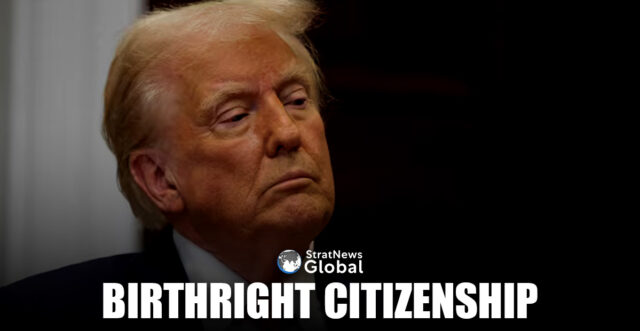A federal judge has blocked the Trump administration from implementing the President’s executive order aimed at limiting automatic birthright citizenship in the United States, calling it “blatantly unconstitutional”.
Trump had signed the order on Monday, his first day back in office.
A Legal Setback To Hardline Policies On Immigration
Seattle-based U.S. District Judge John Coughenour issued a temporary restraining order, preventing the administration from enforcing the order.
The Judge, an appointee of Republican former President Ronald Reagan, dealt the first legal setback to the hardline policies on immigration that are a centerpiece of Trump’s second term as President.
“Obviously we will appeal,” Trump said of Coughenour’s ruling.
What Does The Order Say?
Trump’s executive order had directed U.S. agencies to refuse to recognize the citizenship of children born in the United States if neither their mother nor father is a U.S. citizen or lawful permanent resident.
Impact Of The Executive Order
More than 150,000 newborn children would be denied citizenship annually if Trump’s order is allowed to stand, according to the Democratic-led states.
Judge Wonders How The Order Can Be Called Constitutional
“I am having trouble understanding how a member of the bar could state unequivocally that this order is constitutional,” the Judge told a U.S. Justice Department lawyer defending Trump’s order.
“It just boggles my mind,” the Judge said.
The states argued that Trump’s order violated the right enshrined in the citizenship clause of the U.S. Constitution’s 14th Amendment that provides that anyone born in the United States is a citizen.
“I’ve been on the bench for over four decades. I can’t remember another case where the question presented is as clear as this one. This is a blatantly unconstitutional order,” Coughenour said of Trump’s policy.
Coughenour’s order, announced following a short hearing in a packed courtroom, prevents Trump’s policy from being enforced nationwide for 14 days while the Judge considers whether to issue a long-lasting preliminary injunction.
Next Hearing In February
He will hear arguments over whether to do so on February 6.
Under Trump’s order, any children born in the United States after February 19 whose mother and father are not American citizens or lawful permanent residents, would be subject to deportation and would be prevented from obtaining social security numbers, various government benefits and the ability as they get older to work lawfully.
What Does The Order Imply?
“Under this order, babies being born today don’t count as U.S. citizens,” Washington state Assistant Attorney General Lane Polozola, referring to Trump’s policy, told the Judge during the hearing.
Justice Department lawyer Brett Shumate argued that Trump’s action was constitutional and called any judicial order blocking it “wildly inappropriate.”
But before Shumate had even finished responding to Polozola’s argument, Coughenour said he had signed the temporary restraining order.
Justice Department To Defend Trump’s Order
The Justice Department plans to file papers next week to urge the judge not to issue a longer injunction, Shumate said.
A Justice Department spokesperson said it plans to continue to “vigorously defend” Trump’s order.
“We look forward to presenting a full merits argument to the court and to the American people, who are desperate to see our nation’s laws enforced,” the spokesperson said.
Washington Attorney General Nick Brown, a Democrat, said he sees no reason to expect that the Justice Department would succeed in overturning Coughenour’s ruling on appeal, even if the matter goes to the U.S. Supreme Court, whose 6-3 conservative majority includes three justices appointed by Trump.
“You are an American citizen if you were born on American soil – period,” Brown said.
“Nothing that the President can do will change that.”
Half A Dozen Lawsuits Filed Challenging Trump’s Order
Since Trump signed the order, at least six lawsuits have been filed challenging it, most of them by civil rights groups and Democratic attorneys general from 22 states.
Democratic state attorneys general have said that the understanding of the Constitution’s citizenship clause was cemented 127 years ago when the U.S. Supreme Court ruled that children born in the United States to non-citizen parents are entitled to American citizenship.
The 14th Amendment, adopted in 1868 following the US Civil War, overturned the Supreme Court’s notorious 1857 Dred Scott decision that had declared that the Constitution’s protections did not apply to enslaved Black people.
In a brief filed late on Wednesday, the Justice Department called the order an “integral part” of Trump’s efforts “to address this nation’s broken immigration system and the ongoing crisis at the southern border”.
Legislation Aimed At Restricting Automatic Citizenship
Thirty-six of Trump’s Republican allies in the US House of Representatives on Tuesday separately introduced legislation to restrict automatic citizenship to only children born to American citizens or lawful permanent residents.
(With inputs from Reuters)





